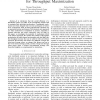Free Online Productivity Tools
i2Speak
i2Symbol
i2OCR
iTex2Img
iWeb2Print
iWeb2Shot
i2Type
iPdf2Split
iPdf2Merge
i2Bopomofo
i2Arabic
i2Style
i2Image
i2PDF
iLatex2Rtf
Sci2ools
INFOCOM
2009
IEEE
2009
IEEE
On Mechanism Design without Payments for Throughput Maximization
—It is well-known that the overall efficiency of a distributed system can suffer if the participating entities seek to maximize their individual performance. Consequently, mechanisms have been designed that force the participants to behave more cooperatively. Most of these game-theoretic solutions rely on payments between participants. Unfortunately, such payments are often cumbersome to implement in practice, especially in dynamic networks and where transaction costs are high. In this paper, we investigate the potential of mechanisms which work without payments. We consider the problem of throughput maximization in multi-channel environments and shed light onto the throughput increase that can be achieved with and without payments. We introduce and analyze two different concepts: the worst-case leverage where we assume that players end up in the worst rational strategy profile, and the average-case leverage where player select a random non-dominated strategy. Our theoretical insig...
Related Content
| Added | 24 May 2010 |
| Updated | 24 May 2010 |
| Type | Conference |
| Year | 2009 |
| Where | INFOCOM |
| Authors | Thomas Moscibroda, Stefan Schmid |
Comments (0)

